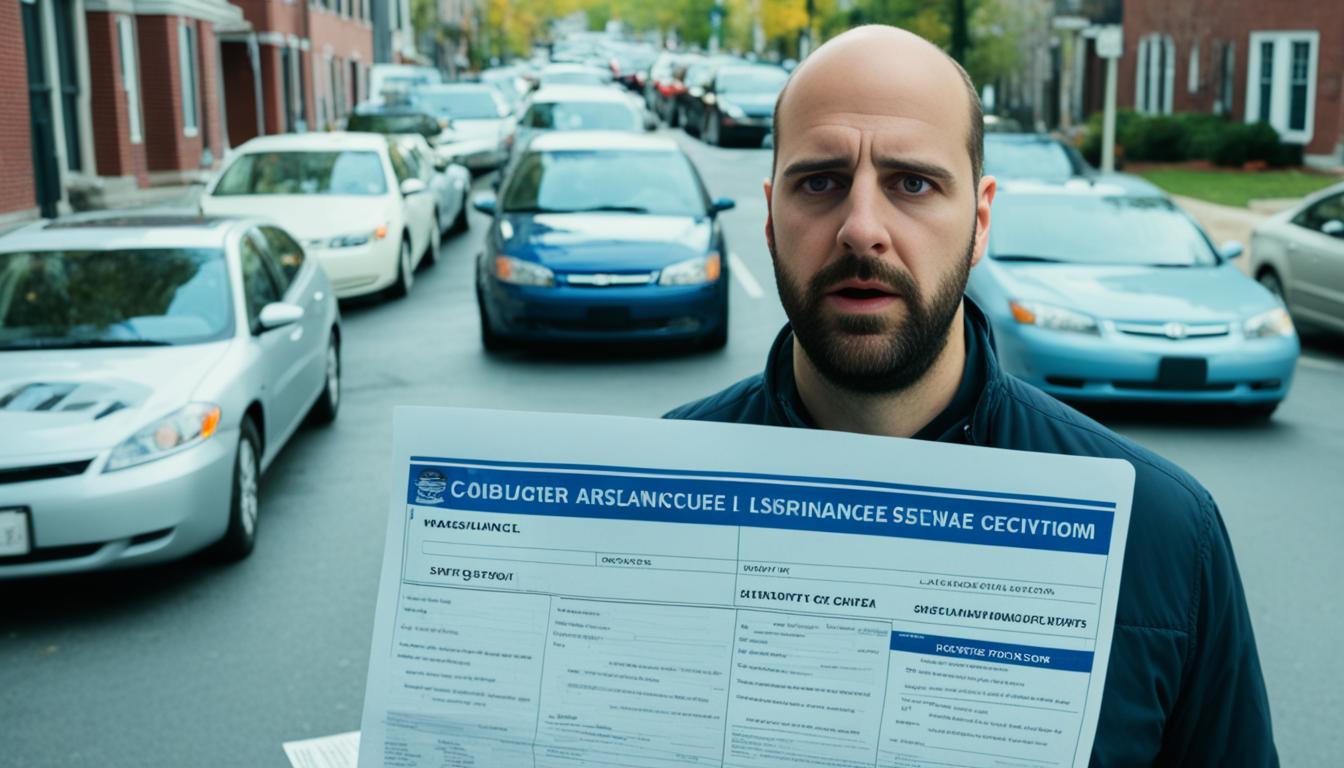If you’re considering changing your car insurance in Massachusetts, it’s essential to have a solid understanding of the process and the important factors to consider. Whether you’re looking to switch insurance companies, modify your policy, or are experiencing a life event that requires an insurance transition, having the right knowledge is crucial.
Massachusetts law mandates that all registered cars must have automobile insurance. It requires four compulsory coverages, including Bodily Injury to Others, Personal Injury Protection, Bodily Injury Caused by an Uninsured Auto, and Damage to Someone Else’s Property. These coverages provide essential protection in case of accidents or other incidents.
Additionally, there are optional coverages available that can provide extra protection and customization to suit your specific needs. It’s important to work with an experienced insurance agent or professional to determine the appropriate coverage levels and options for your situation.
Key Takeaways:
- Changing your car insurance in Massachusetts requires understanding the compulsory coverages mandated by law.
- Optional coverages can provide additional protection and customization.
- Seek guidance from an insurance agent or professional to ensure proper coverage levels.
- Compare rates and coverage options when switching insurance companies.
- Be aware of the cancellation process and any potential fees associated with switching policies.
Understanding Compulsory Coverages in Massachusetts
In Massachusetts, if you own a car, it is mandatory to have car insurance. There are four compulsory coverages that must be included in your car insurance policy to ensure compliance with the law and protect yourself and others on the road.
Bodily Injury to Others
One of the compulsory coverages is Bodily Injury to Others. This coverage is designed to protect you from legal liability for injuries caused to others while operating your car. Accidents happen, and this coverage ensures that you have financial protection in case someone is injured as a result of your actions. It provides coverage for medical expenses, lost wages, and even legal defense expenses if you are sued.
Personal Injury Protection
Personal Injury Protection (PIP) is another important coverage required in Massachusetts. PIP covers medical expenses and lost wages for you and others involved in an accident, regardless of who is at fault. This coverage provides essential financial support for medical bills, rehabilitation costs, and even necessary household services that you may require during your recovery.
Bodily Injury Caused by an Uninsured Auto
What happens if you’re involved in an accident with an uninsured driver or a hit-and-run situation? Bodily Injury Caused by an Uninsured Auto coverage offers protection in such scenarios. This coverage ensures that you have financial support for medical expenses, lost wages, and other damages resulting from an accident caused by an uninsured or unidentified driver.
Damage to Someone Else’s Property
Accidents can also lead to property damage. Damage to Someone Else’s Property coverage provides coverage for any damage caused by your vehicle to another person’s property. Whether it’s a vehicle, a fence, or any other property, this coverage ensures financial protection to cover the cost of repairs or replacement.
When purchasing car insurance in Massachusetts, it’s important to meet the minimum coverage amounts set by law. The minimum coverage amounts for Bodily Injury and Bodily Injury Caused by an Uninsured Auto are $20,000 per person and $40,000 per accident. For Personal Injury Protection, the minimum coverage amount is $8,000 per person. Finally, Damage to Someone Else’s Property has a minimum coverage amount of $5,000 per accident.
While these are the mandatory coverages in Massachusetts, it’s essential to also consider additional optional coverages that can provide extra protection and customization for your car insurance policy.
Exploring Optional Coverages in Massachusetts
In addition to the compulsory coverages required by law, car insurance in Massachusetts offers several optional coverages that provide additional protection and customization. These optional coverages allow drivers to tailor their insurance policies to their specific needs and preferences.
Bodily Injury to Others
One of the optional coverages available is increased coverage for bodily injury to others. This coverage extends the limits of liability protection, providing additional financial security in the event of an accident where you are at fault and cause injury to another person.
Underinsured Motorist Coverage
Underinsured motorist coverage is another optional coverage that can provide valuable protection. It comes into play when you are involved in an accident with a driver who has insufficient insurance to cover the damages. Underinsured motorist coverage helps bridge the gap between the other driver’s policy limits and the actual cost of the damages or medical expenses.
Comprehensive and Collision Coverage
Comprehensive and collision coverage offers protection for your own vehicle in various situations. Comprehensive coverage covers damages caused by events such as theft, vandalism, fire, or natural disasters. Collision coverage pays for damages resulting from accidents where your vehicle collides with another car or object.
Medical Payments Coverage
Medical payments coverage is an optional coverage that covers medical expenses for you and your passengers resulting from an accident, regardless of who is at fault. This coverage can help alleviate the financial burden of medical bills and ensure that you receive the necessary care.
In addition to these optional coverages, insurance companies in Massachusetts may offer other additional coverages such as coverage for substitute transportation, roadside assistance, or even pet coverage. It’s essential to discuss these options with your insurance agent to determine which ones best suit your needs.
If you’re considering adding any of these optional coverages to your car insurance policy in Massachusetts, take the time to carefully review and compare the coverage limits, deductibles, and premiums offered by different insurance companies. This way, you can make an informed decision and select the optional coverages that provide the right level of protection for you and your vehicle.

Tips for Changing Your Car Insurance in Massachusetts
When it comes to changing your car insurance in Massachusetts, it’s important to be well-informed and prepared. Here are some valuable tips to guide you through the process:
1. Obtain Car Insurance Quotes
Start by obtaining car insurance quotes from multiple insurance companies. This will allow you to compare coverage options and prices, helping you make an informed decision.
2. Work with an Insurance Agent
Consider working with an insurance agent or professional who specializes in car insurance. They can provide expert guidance and help you determine the appropriate coverage levels based on your needs and budget.
3. Inquire About Insurance Discounts
Don’t forget to inquire about any available insurance discounts that you may qualify for. Insurance companies offer various discounts, such as safe driver discounts, multi-policy discounts, and good student discounts. Taking advantage of these discounts can significantly lower your insurance premiums.
4. Understand Policy Provisions and Limitations
Take the time to review and understand the policy provisions and limitations of each insurance company you consider. This way, you’ll be aware of any specific terms, conditions, or exclusions that may apply to your coverage.
5. Cancel Previous Policy and Obtain New Coverage
Before switching insurance companies, make sure to cancel your previous policy and obtain new insurance coverage to avoid a lapse in coverage. This ensures that you are continuously protected while making the transition.

The Process of Switching Car Insurance Companies
Switching car insurance companies is a relatively simple process that can be done with a few important steps. Whether you’re looking for lower rates, better coverage, or improved customer service, changing your car insurance provider is a strategic decision that requires careful consideration.
1. Compare Rates and Coverage Options
Start by researching and comparing rates and coverage options from different insurance providers. Look for companies that offer competitive prices and the coverage you need. Take into account factors such as deductibles, limits, and additional benefits.
2. Consider Cancellation Fees
Before making the switch, check if your current car insurance company has any cancellation fees. These fees can vary, so make sure to include them in your decision-making process. Even with cancellation fees, switching to a more affordable or comprehensive policy may still save you money in the long run.
3. Purchase New Coverage
Once you have identified a new insurance company, purchase the new coverage before canceling your current policy. This ensures that you have continuous coverage and avoids any gaps or lapses in protection. It’s important to schedule the start date of your new policy to align with the expiration date of your current coverage.
4. Obtain Insurance ID Card
After purchasing your new car insurance policy, make sure to print out or download your insurance ID card. This card serves as proof of coverage and should be kept in your vehicle at all times to provide to law enforcement or other parties if needed.

5. Inform Your Lender
If you have an auto loan or lease, it’s crucial to inform your lender about the switch in insurance coverage. Lenders often require borrowers to maintain a certain level of insurance coverage for the duration of the loan or lease agreement. Provide them with the necessary details of your new insurance company and policy to ensure compliance with their requirements.
Remember, switching car insurance companies is your right as a customer. Take the time to carefully evaluate your options and find the policy that best meets your needs and budget. Don’t be afraid to ask questions and clarify any concerns with the insurance providers you are considering.
By following these steps, you can successfully switch car insurance companies and enjoy the benefits of a new policy that offers the coverage, price, and customer service you desire.
Conclusion
Changing your car insurance in Massachusetts requires careful consideration and research. Understanding the compulsory coverages required by law, such as Bodily Injury to Others and Damage to Someone Else’s Property, is essential. Additionally, exploring optional coverages like underinsured motorist coverage and comprehensive and collision coverage can provide added protection.
When switching car insurance companies, take the time to compare rates, coverage options, and discounts to ensure you are getting the best deal. Working with an insurance agent or professional can help navigate the process smoothly and avoid any gaps in coverage. Remember to cancel your previous policy and obtain new insurance coverage before making the switch.
By following these steps, you can successfully transition to a new car insurance policy that meets your needs and provides the adequate protection required in Massachusetts. Take the time to understand your options, consult with professionals, and make an informed decision for a seamless policy transition and insurance switch.




No comments! Be the first commenter?